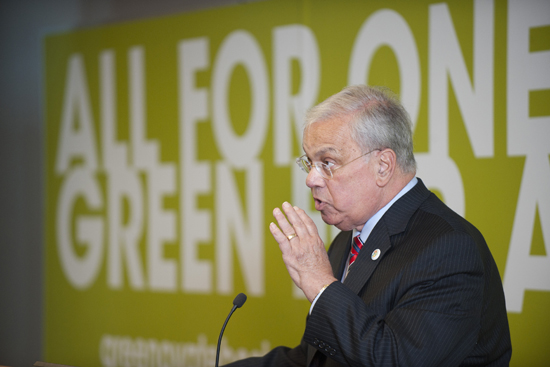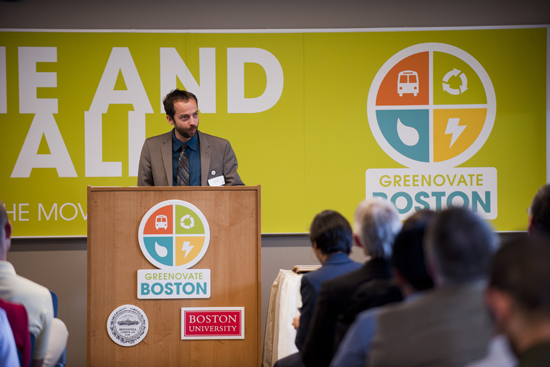BU Earns Greenovate Boston Award
Hosts ceremony, receives one of 18 sustainability honors

Dennis Carlberg (from right), the University sustainability director, holds up BU’s Greenovate Boston Award alongside Mayor Thomas M. Menino (Hon.’01) and Gary Nicksa, senior vice president for operations. Photos by Cydney Scott
BU’s favorite color—right behind scarlet and white, of course—is green. Why?
Because the University has made a solid commitment over the past several years to embrace ecofriendly practices that have revolutionized the way it consumes energy and water, reduces waste, and expands in a sustainable manner. Now, that dedication to green living has caught the attention of Boston city officials.
On May 14, BU was honored by Mayor Thomas M. Menino (Hon.’01) with a Greenovate Boston Award at a ceremony hosted at the Center for Student Services, along with 12 other nonprofits and businesses, 3 residential property leaders, and 2 sustainable food leaders. The occasion was the mayor’s launch of Greenovate Boston, a citywide initiative he hopes will ensure a greener, healthier, and more prosperous future for the city by encouraging more people to bike, recycle, and weatherize buildings, among other steps.
“To be asked to host the launch of Greenovate Boston here at BU is truly an honor,” said Dennis Carlberg, the University’s sustainability director. “To receive a Greenovate Boston Award in addition, well, that really shows the progress the University has made to a more sustainable campus. This is a great day for Boston University.”

With a Greenovate Boston banner proclaiming “All for One: Green for All” hanging behind him, Menino credited award recipients for caring deeply about sustainability and urged them to be green ambassadors. That means “turning the science talk into sidewalk talk,” he said. “Very few people understand what climate change is.”
Getting all Boston residents to understand that message is essential if the mayor hopes to meet his goal of reducing the city’s greenhouse gas emissions by 25 percent by 2020 and 80 percent by 2050.
Menino asked those assembled in the packed sixth-floor conference room to think about one question: “What can we do in our lives to make Boston the greenest city in the world?” He said the goal can be achieved through basic changes, like adopting single-stream recycling at home or switching from driving to biking, walking, or taking public transportation to work once a week.
“People are Boston’s greatest asset,” he said. “Greenovate takes that message and puts it into action.”

Brian Swett, Boston’s chief of environment and energy, said Greenovate Boston will focus on decreasing carbon dioxide emissions, primarily by educating every resident and business about how individual actions can make a difference. Newly minted Greenovate Fellows, staff members Benita Hussain and Charles Zhu will lead the effort, working to expand the initiative. Their initial goal is to get one-third of residents and city employees to adopt more sustainable practices, like unplugging their TVs at night or washing laundry in cold water.
“These seemingly small actions really do matter,” Swett said. He encouraged attendees to visit the Greenovate Boston website, which he called a “one-stop shop for all of your sustainability information,” and to tell others about it.
He then announced the winners of the 18 Greenovate Boston Awards, formerly called the Mayor’s Green Awards. “Selecting the awards this year was unbelievably challenging,” he said, because of the record number of quality applicants.
BU was one of 13 commercial and nonprofit organizations receiving an award; among the others were Spaulding Rehabilitation Network, Dependable Cleaners, the Rose Kennedy Greenway, and the Sheraton Boston Hotel.

Carlberg and Gary Nicksa, BU senior vice president for operations, accepted the award from Menino as Swett ran down a list of the University’s sustainable accomplishments. Since 2005, BU has reduced greenhouse gas emissions by 15 percent, energy consumption by 9 percent, and water use by 10 percent—despite campus growth of 13 percent. The University also has reduced its overall waste by 11 percent and increased its recycling rate from 3 percent to 32 percent.
Sustainable building projects have saved more than 157,000 MMBTUs (million metric British thermal units) of energy, enough to power 1,700 homes. BU boasts 526,000 square feet of Leadership in Energy and Environmental Design (LEED)–registered space, with two LEED Gold certifications—for the Center for Student Services, at 100 Bay State Road, and for the 122 Bay State Road administrative offices.
Awards also went to the Mei Mei Group and Community Servings for their leadership in the sustainable food sector. Boston-based property managers Federal Management Company, Elizabeth Charles, of Dorchester, and Mark Liu, of the Chinese Progressive Association, received awards for their leadership in “greenovating” low-income housing.
Comments & Discussion
Boston University moderates comments to facilitate an informed, substantive, civil conversation. Abusive, profane, self-promotional, misleading, incoherent or off-topic comments will be rejected. Moderators are staffed during regular business hours (EST) and can only accept comments written in English. Statistics or facts must include a citation or a link to the citation.